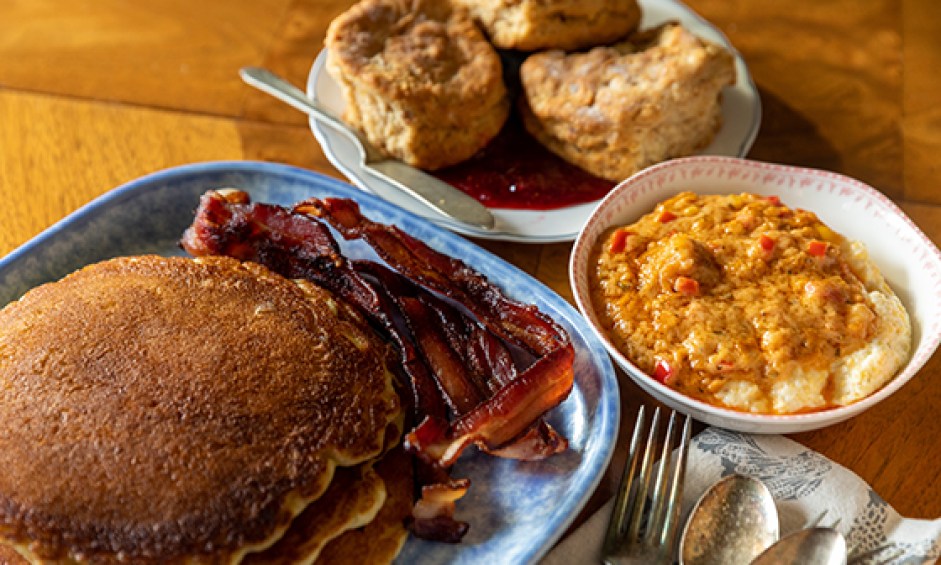Restauranteurs Greg and Subrina Collier have quickly made their mark in Charlotte’s culinary scene, first with the opening of The Yolk and later, Leah & Louise. Now, the couple is slated to debut four new culinary concepts this year in Charlotte’s popular Camp North End. Beyond the food, the Colliers are building something special through their Bayhaven Restaurant Group: a business model and mission that promotes and elevates Black excellence in culinary arts and hospitality. THE BLOCK caught up with Greg and Subrina to talk about their love for their craft and each other. Staff writer Ron “Styles” shares his encounter with the Colliers below. Enjoy.
For us and our journey, we’re always going to be teaching. We’re always going to be educating.
Subrina Collier
What if I told you one of the nation’s most innovative restaurants is based in Charlotte? What if I told you said restaurant, Leah & Louise, was born from Black love at a wing spot in Memphis? What if I also told you that the success of Leah & Louise has led to the establishment of a culinary ecosystem enabling other upcoming restaurateurs with the tools they need to be successful?
It would be the perfect verse over a tight beat.
As I was mobbin’ thru a standard Wednesday, lining up that good ol’ Zoom meeting, this time to knock out another article, I knew that I wasn’t about to interview Dre and Sydney about that record label of his that she financed or how my boy asked her out with the “yes, no, maybe” checkboxes—although their common love for hip-hop mirrors the common love this couple has for food. But, I also had zero knowledge of the energy Greg & Subrina Collier were about to bring through this 16” laptop screen of mine.

It’s hard not to feel refreshed after having a conversation with a couple so motivated to execute their collective visions. Teamwork, sacrifice, dedication, communication, trust and honest, hard work have led these two to become the face of the whole “be the change you want to see” movement.
With Greg being from Whitehaven and Subrina from Frayser “Bay,” their Memphis beginnings couldn’t have been more humble.
“We lived on opposite sides of town,” Greg recalled about the distance between northernmost Frayser and southernmost Whitehaven. “We met at a hot wing spot by the University of Memphis that’s actually in the middle of the city. You know, I was washing dishes and kind of grew to be one of the cooks in the kitchen in 2003 or 2004. About three years after that, I decided to go to culinary school. But Subrina and I never really dated officially at all. ‘Cause wasn’t nothing shaking!”
With Subrina already pursuing her passions in nearby Nashville, it was Greg’s leap to Phoenix in 2007 that really sparked their under-the-surface connection.
“I’d already moved to Nashville. He said he was going to culinary school sooner, but he went later, and I wasn’t sure if he was serious about going,” Subrina revealed. “We’d started hanging out, but we weren’t really sure about dating because it was so far away.
“But when he moved away, he really grew up. He was like, ‘I really love this, I really love cooking,’” she continued. “When my lease was up, I moved out there to Phoenix with him.”
Not only was that a geographical jump, but a cultural one as well. Memphis is one of the Blackest cities in America per capita. Phoenix on the other hand, is quite the opposite. These are situations where your love—whether personal passions or romantic relationships—are put to the test. This would be the first time the future Colliers would be hopping out of the frying pan and into the fire.

“The South got something to say, and that’s all I got to say.”
Andre 3000
After marrying in 2010, Greg’s culinary education had come to an end, and he felt his inner Andre 3000 budding up.
“I got to a point where I needed to say something culinarily, but I knew nobody was going to let me do that in Phoenix,” he explained. “But sometimes your convictions are [also] so strong that, even if what someone was saying was correct, like ‘you need to do this or you need to do that,’ you don’t believe it.”
And that feeling is real for a lot of business owners.
Let’s face it, if you’re an entrepreneur or if you’ve just launched a side hustle and are trying to build it up, sometimes what you feel is greater than what you may actually know at that time. That can be a treacherous place to operate in, but it’s the hard work and dedication that pulls you over to success.
Nothing demanded hard work and dedication like the leap the Collier’s took in 2012, moving from Phoenix back East, eager to begin their own venture.
Spurred by Subrina’s father relocating to Charleston for his job, Greg and Subrina first touched down in ChuckTown, but quickly learned that some places in the South still love their “heritage.”
“I’m not a huge Charleston fan. It’s too close to the water. I like the food scene, culturally. But Black people in Charleston? That’s another conversation. I don’t feel like we’ve really had a chance in a city that we built. Charleston was built on the backs of slaves, no question!” Subrina said.
“We didn’t know anybody, so the cultural connections that we’ve made in the Gullah-Geechie community happened after we left. We were in Charleston and didn’t get to go to any Black-owned spots because we were in Summerville. We weren’t in Charleston proper, we never hung out with people or had the chance to build with anybody,” Greg added.

Combine the existence and preservation of actual plantations with a community vibe that didn’t gel with their Memphis upbringing, Subrina began exploring cities within driving distance that better suited the opportunities they were looking to take and make.
“I knew some of Charleston history, but I couldn’t believe that there were actual plantations that were still open. That was jarring to me. Yet, I wanted to be close to my parents,” Subrina explained.
“That’s when I looked up ‘cities great for young Black entrepreneurs’ or something like that, and Charlotte was like top three on the list.”
With some financial assistance from Subrina’s parents and a good amount of sweat equity, the couple was able to launch in Rock Hill, sort of as a buffer city between Charleston and Charlotte. It wasn’t glamorous. They did their own renovations. No soda machine meant poppin’ cans and running to get ice for the cooler. They definitely had to get it out of the mud. But, the Colliers made it work and were able to flip it forward to the next chapter of their journey.
“We didn’t even have proper equipment. I just had a really strong feeling that, ‘If I can say this thing through food, and I can have my wife help me, we’ll be fine.’ I don’t think, back then, I thought about getting to where we are now, but as we’ve grown I’m like, ‘OK, this is where we’re supposed to be’ and then, as we grow a little bit more, there’s another place for us to get to and we’re supposed to be there,” Greg said.
It took a few years for the culinary tag team to figure out how they were going to be partners. Remember, this couple was just married in 2010, and in 2012 they were going into business with each other.
“you learn. Even when those mistakes cost you money, Those are the best ones because you’ll be very careful next time.”
Subrina collier




Fast forward to the incredible, recent success of the handcrafted embodiment of their dreams: Leah & Louise, a Beale Street inspired, modern juke joint restaurant in the heart of Camp North End. Greg and Subrina have also launched Bayhaven Restaurant Group, along with the Bayhaven Food & Wine Festival (remember those neighborhood names?) Both with the aim of elevating and broadening the voices of Black chefs and mixologists.
When asked if the couple’s current operations are a result of not having or being made aware of such opportunities while on their ascent, Mr. Collier had this to say: “100 percent.”
“Sometimes when you get in situations, it’s better for you not to know how much you don’t know, because if you really knew how much you were going to go through, you’d be like, ‘Nah, I don’t want that,’” Greg added.
The jump from worker to owner is a crazy leap for most, and even with all of the inner working knowledge and frontline experience from both Greg and Subrina, it wasn’t enough at the very beginning. Some things can’t prepare you for business ownership, and if it’s anything the Colliers can do to help another Black chef, sous chef, manager or mixologist not make the same mistakes they made—they aim to fill that gap.
“Our mentoring styles are a little different. Greg is super hands-on, but me, I’m a nudger. If I feel like you’re going in a direction where you’re taking the proper steps, you’re doing outside learning, then I’m going to nudge you. I don’t drag people, I’m going to push you because I see you doing what you need to do. That’s important to us.
“Guys like Oscar Johnson, Darryl Cooper of Jimmy Pearls, I’m super proud of them. Greg’s worked with them. Oscar’s worked with us and for us in one of our places, and to see them branch out makes us happy.”
Puff told me, the key to this joint, the key to staying on top of things is to treat everything like it’s your first project, know what I’m saying? Like it’s your first day, like when he was an intern. Like, that’s how you got to treat things. just stay hungry.”
The Notorious B.I.G.
… And staying hungry, literally and figuratively, is what drives The Colliers every single day.
That Memphis brashness caught fire in the desert and the couple hasn’t looked back since. From countless awards and recognitions, most notably Greg’s third James Beard Award nomination this year (the Oscars of the food industry in which he was also nominated in 2019 and 2020), along with Subrina’s first, extremely successful Bayhaven Food & Wine Festival in 2021, this couple is looking to shatter any and all glass ceilings—and bring as many people along with them as they can.

Bayhaven Restaurant Group and the corresponding food and wine festival are the two main threads in a growing tapestry of redefining “Black food.” Think about it. Whenever you’re told a restaurant is Black-owned, what do we first think of? Likely, soul food. Something fried, something green, macaroni and cheese, some type of potato, something with some gravy, cornbread or roll and some sweet tea.
Absolutely nothing wrong with that. Hell, I live two minutes from La’Wan’s and been eating Mr. Kenny’s cooking since I was in high school. But, if Greg and Subrina have any say in the matter, it’s time we broaden our scope on all that a “Black restaurant” can encompass.
“Black people kind of get pigeonholed in the restaurant industry. La’Wan’s is La’Wan’s, Nana’s is Nana’s, those are authentic, complete soul food restaurants and they are amazing. But we want to show people that is one side of Black food, this is another side,” Subrina said, rolling off classic Charlotte spots one by one.
“I’d be willing to argue that it’s been kind of a self-fulfilling prophecy. Because, those foods are the ones that Black people brought with them up through the South and those are the popular foods that white people hung on to first. So that’s the [food] that gets celebrated first, and then stolen and bastardized first,” Greg added.
“I think at times, we as a [Black] people reverted to saying ‘[Soul Food] is our food’ without giving credence to anything else. Barbecue is Black food, Gullah-Geechee food is Black food, low country food is Black food, Caribbean food is Black food. All of those things are Black food, but I think because they lumped us into a place, I don’t want to say we lost it, but we let go,” he continued.
“I see now, a resurgence of Black Chefs cooking their own food and not just soul food.”

When I’m on TV, I’m Black as hell. I got my hoodie on, I got a skully on. I need people to know I’m 6’4”, 200-something and I’m a big, Black ass dude that can really, really cook.
I need people to associate the context of the thing that they like, with the person instead of all the other stuff they would associate me with.
Greg Collier
Broadening the scope isn’t without challenges, however. Sadly, many people have the Birdbox blindfolds on when it comes to trying new things. For example, I don’t like gouda in my macaroni and cheese although Subrina promises it’s fye. These are things that I’m scared to risk my dinner plate on, and I know I’m not alone. But with all of that learning in the Colliers first seven years of ownership, they have fully embraced and stepped into their roles as teachers for not only the next generation of Black chefs and restauranteurs, but also their patrons.
“For a long time, Black people didn’t have the freedom to think outside of the box. They’ll ask a white Chef ‘What kind of food do you make?’ but with a Black chef it’ll be ‘Oh, you make soul food?’ We would get people coming in to The Yolk and ask if it’s a soul food spot,” Subrina recalled. “And it wasn’t just white people, sometimes we’re introducing it to our own people.
At the end of it all, authenticity is at the core of who and what The Colliers represent. They’re going to let you know they’re from Memphis. They’re going to let you know they’re Black. They’re going to let you know they’re nice at what they do. And they’re going to simultaneously help you get your ducks in a row.
“I want people to understand that there’s a lot going on in the Black context. I want people to gain knowledge about the Black experience because it’s broad and I want to represent that,” Greg explained.
The phrase “Black people are not a monolith” is definitely applicable here. Greg and Subrina have defied the odds and continue to go against the grain in an industry not usually kind to us.
And with the way their menus are setup and the way them plates look, we all about to be Birdman hand rubbing after we say grace. So, in the words of my grandaddy, Aaron Bouler, Sr., “Good food, good meat, good God, let’s eat.”
Amen.
Main photo: Greg and Subrina Collier (photo courtesy of Peter Taylor Photography)
Sorry, the comment form is closed at this time.





Rena Walker
Truly a very well written article!!! The reference to your grandfather, my father, is the “icing on the cake”.